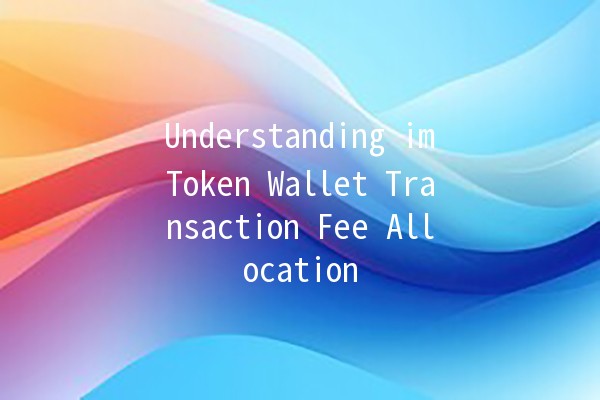In today’s evolving digital landscape, cryptocurrency wallets like imToken have garnered significant attention, not just for their security features but also for their transaction fee mechanisms. Understanding how these fees are allocated can greatly impact your trading experience and investment strategies. This article delves deep into the allocation of transaction fees within the imToken wallet, offering valuable insights and practical tips to optimize your crypto transactions.
Transaction fees in cryptocurrency are amounts paid to miners or validators to process and confirm transactions on a blockchain. These fees can fluctuate based on network demand and the complexity of the transaction. In the context of the imToken wallet, understanding how fees are structured is crucial for traders looking to maximize their gains while minimizing costs.

imToken wallet has implemented a unique approach to transaction fees, which consists of the following components:
The base fee is the fundamental fee required to process a transaction. It is determined by the network protocols of the cryptocurrency in question. imToken automatically adjusts this base fee based on current network conditions to ensure timely processing.
In addition to the base fee, users can optionally include a miner’s tip to incentivize faster transaction processing. This tip can vary depending on how urgently the user wants the transaction to be confirmed.
imToken uses a dynamic fee adjustment feature that monitors network conditions. This technology allows users to set their fees according to how quickly they want their transactions to be processed.
Gas price is a critical aspect of Ethereum transactions, as it reflects the cost of computational operations on the network. imToken allows users to select a gas price depending on their transaction urgency and budget, which can significantly influence the overall fee.
Fees may differ according to the cryptocurrency being transacted. For instance, Ethereum transactions typically incur different fees compared to Bitcoin due to their underlying blockchain technologies.
To enhance your trading efficiency and minimize costs, consider the following five practical tips for optimizing transaction fees within the imToken wallet:
Staying informed about network congestion can help you choose the right time to execute your transactions. Using tools like gas trackers can give you insights into realtime transaction fees, enabling you to decide when to make a move.
If Ethereum's gas prices are low on a Sunday, it might be beneficial to execute your transactions then rather than on a busy weekday.
imToken allows users to set custom gas prices. If you aren’t in a hurry, setting a lower gas price can save you money. However, take care not to set it too low, as this may lead to slower transaction confirmations.
For nonurgent transactions, you might set a gas price of 20 Gwei instead of the current average of 40 Gwei, potentially halving your fee.
If you are conducting multiple transactions, consider consolidating them to minimize fees. Each transaction incurs its fee, so batching multiple transfers into one can significantly reduce costs.
Instead of sending small amounts to multiple recipients, send one larger transaction that covers everyone.
imToken often provides fee suggestions based on current network conditions. Using these recommendations can help you avoid overpaying for a transaction while ensuring it is still processed in a timely manner.
Before finalizing a transaction, check the suggested fee and adjust accordingly to achieve a balance between cost and speed.
Sometimes, cryptocurrency platforms run promotions that can reduce transaction fees. Keeping an eye on such opportunities can provide additional savings.
Participating in imTokenbased promotions during special events might allow you to execute transactions at a reduced or even offer feefree periods.
Transaction fees can vary due to several factors, including network congestion, transaction size, and the complexity of the operations being performed. Understanding these variables can aid in anticipating fee changes.
Once a transaction is submitted to the network, you typically cannot modify the fee. Therefore, it's crucial to doublecheck your settings before finalizing the transaction.
A transaction may be pending if the network is congested and your gas price is set too low. In such cases, increasing the gas price may be necessary to prioritize your transaction.
While fees can differ from wallet to wallet due to their underlying technologies, imToken is designed to offer competitive fee structures. Researching and comparing various wallets can help you choose the best option for your needs.
Internal exchanges within the wallet may incur different fees depending on the cryptocurrencies involved. Checking imToken’s fee schedule can provide clarity on costs.
If you've set a gas price too low and your transaction is still pending, you may be able to cancel it or replace it with a transaction at a higher gas price. Monitoring your transaction status can facilitate swift action.
Navigating transaction fees in the imToken wallet is vital for maximizing your trading efficiency and minimizing costs. By understanding the different components influencing these fees and implementing practical strategies, you can enhance your overall crypto experience. Whether it’s by monitoring network conditions, setting optimal gas prices, or leveraging promotional offers, informed decisionmaking can lead to significant savings and improved transaction outcomes.
With this knowledge, you can make smarter choices in your cryptocurrency transactions, ultimately leading to a more rewarding trading experience.